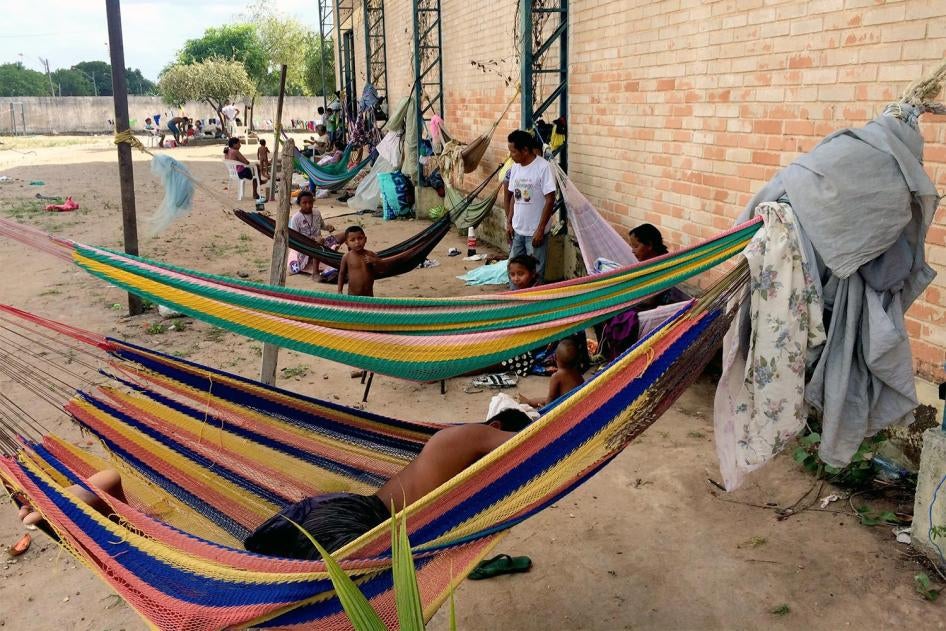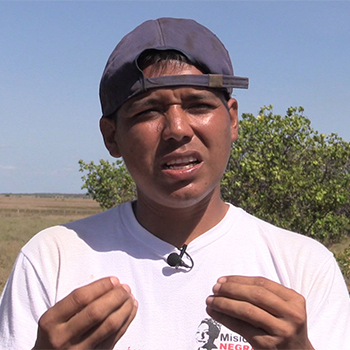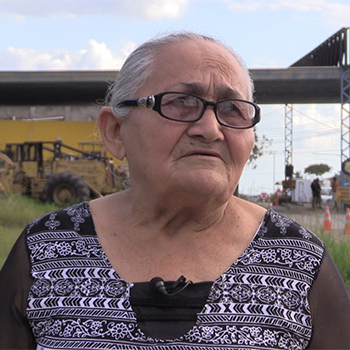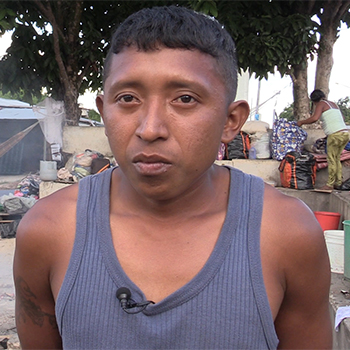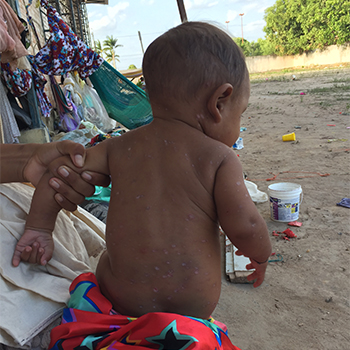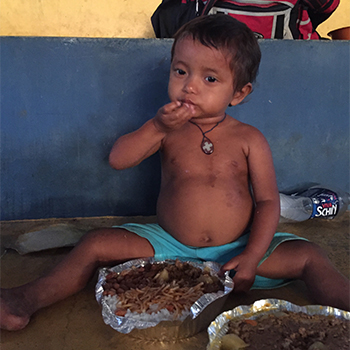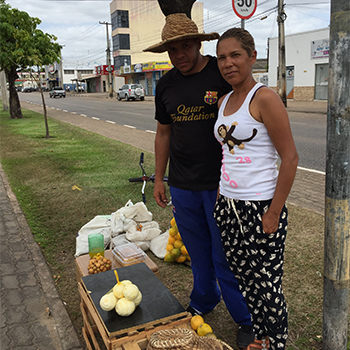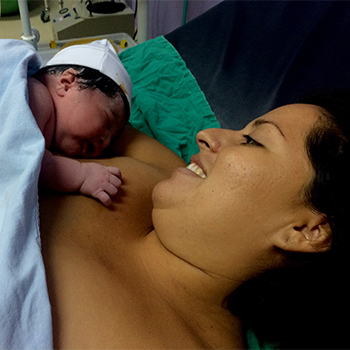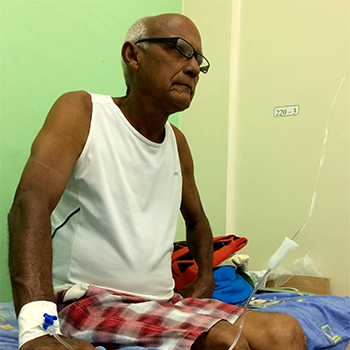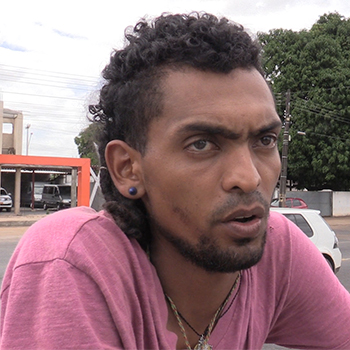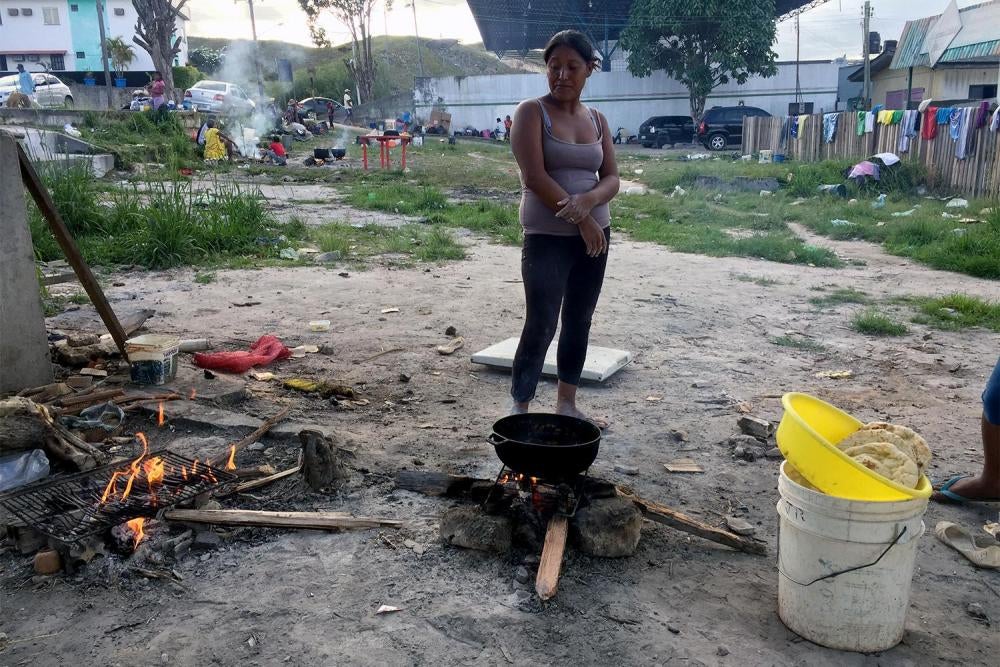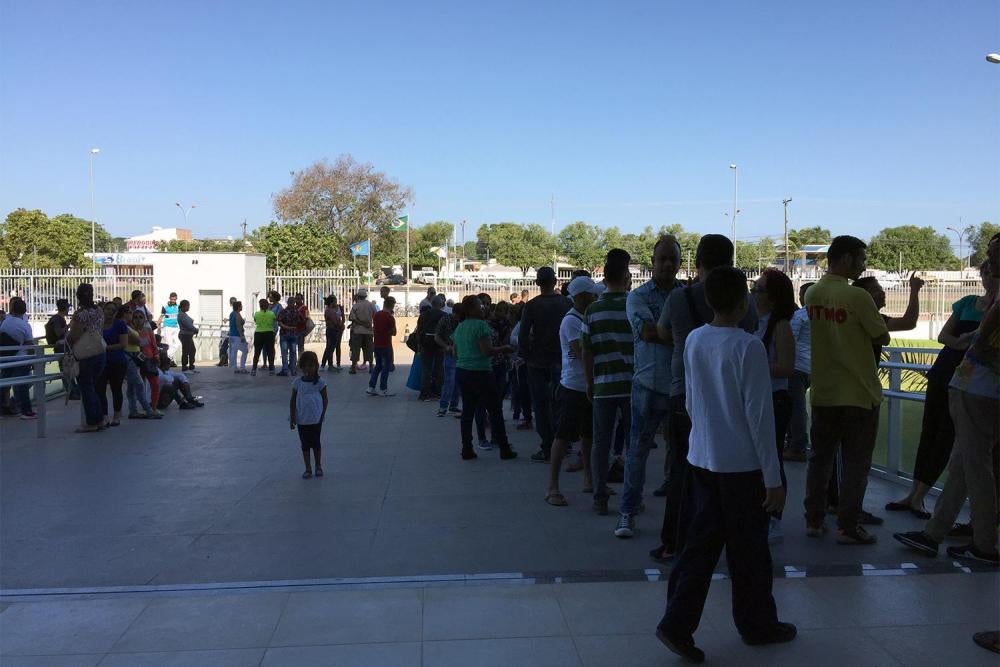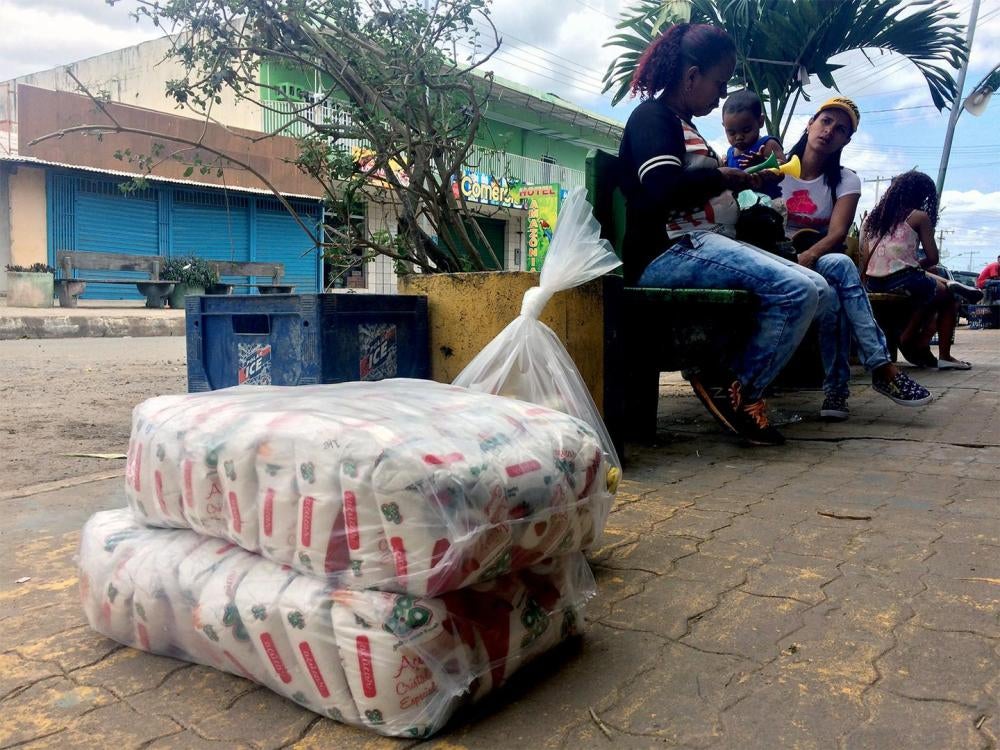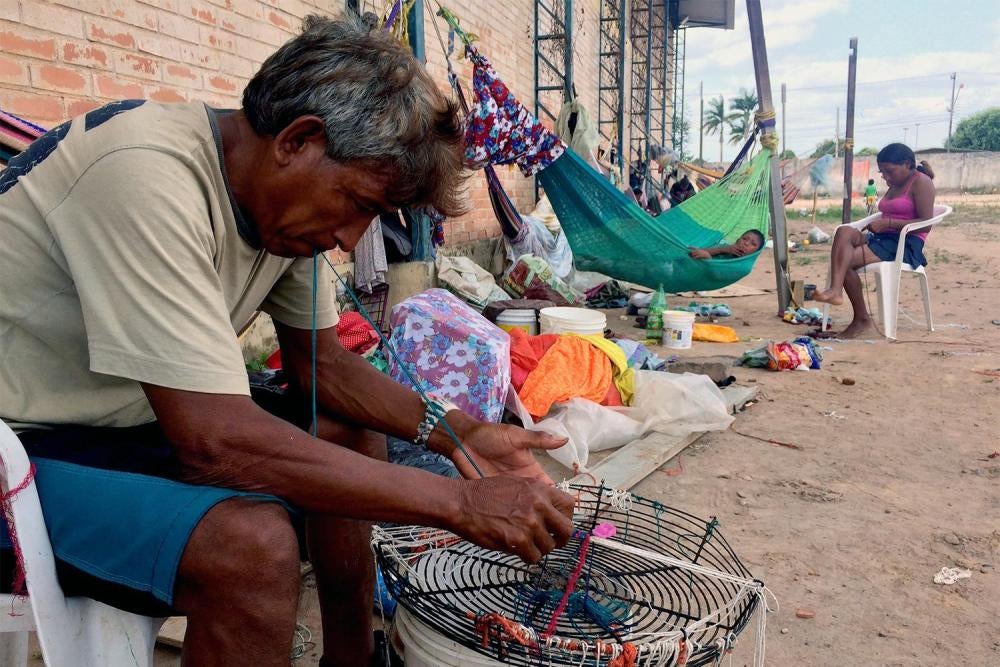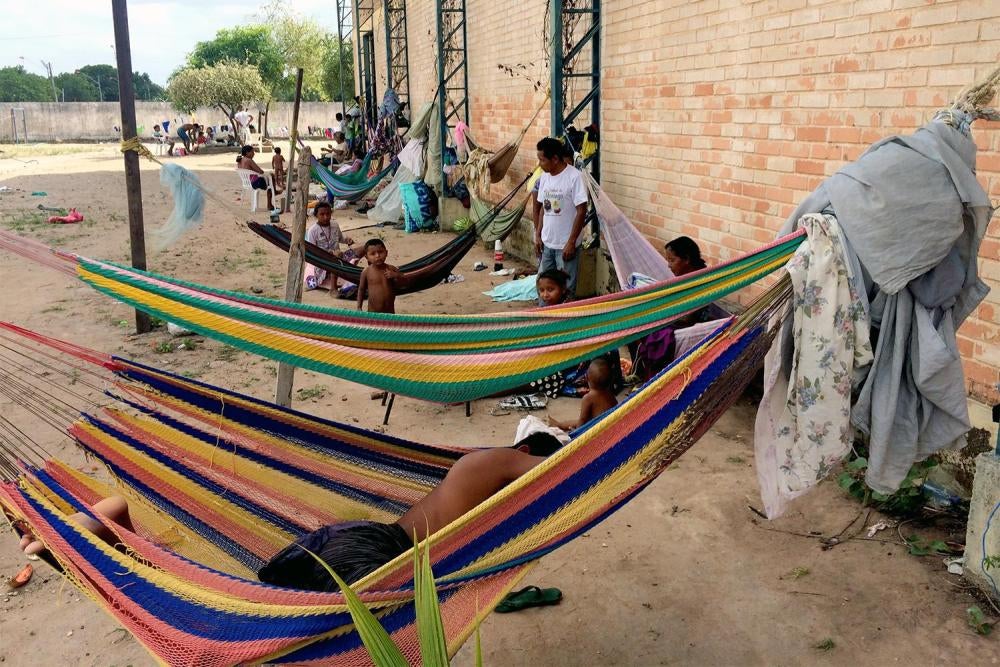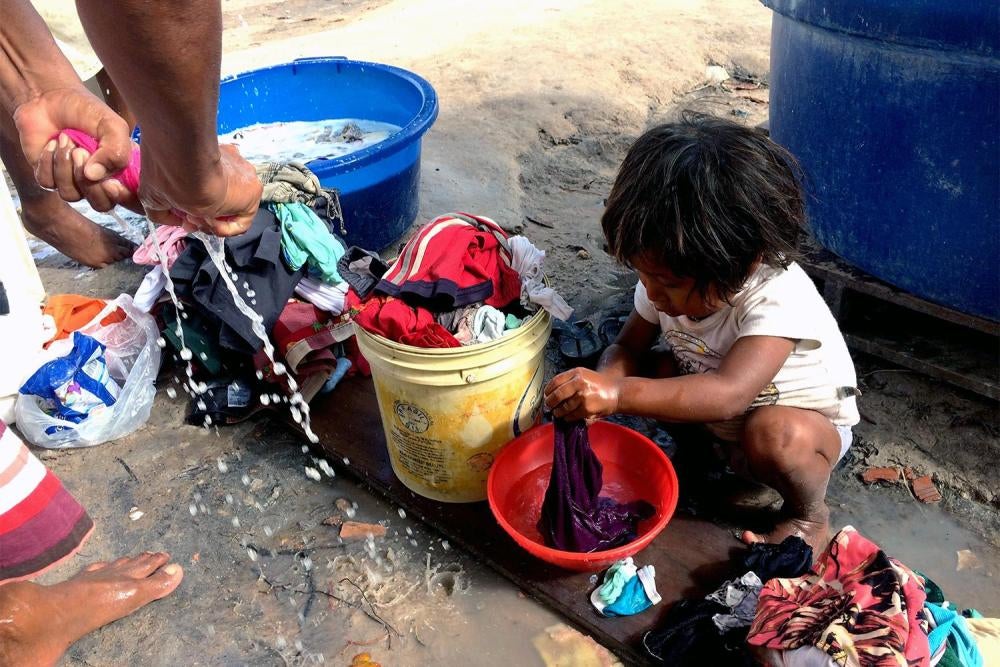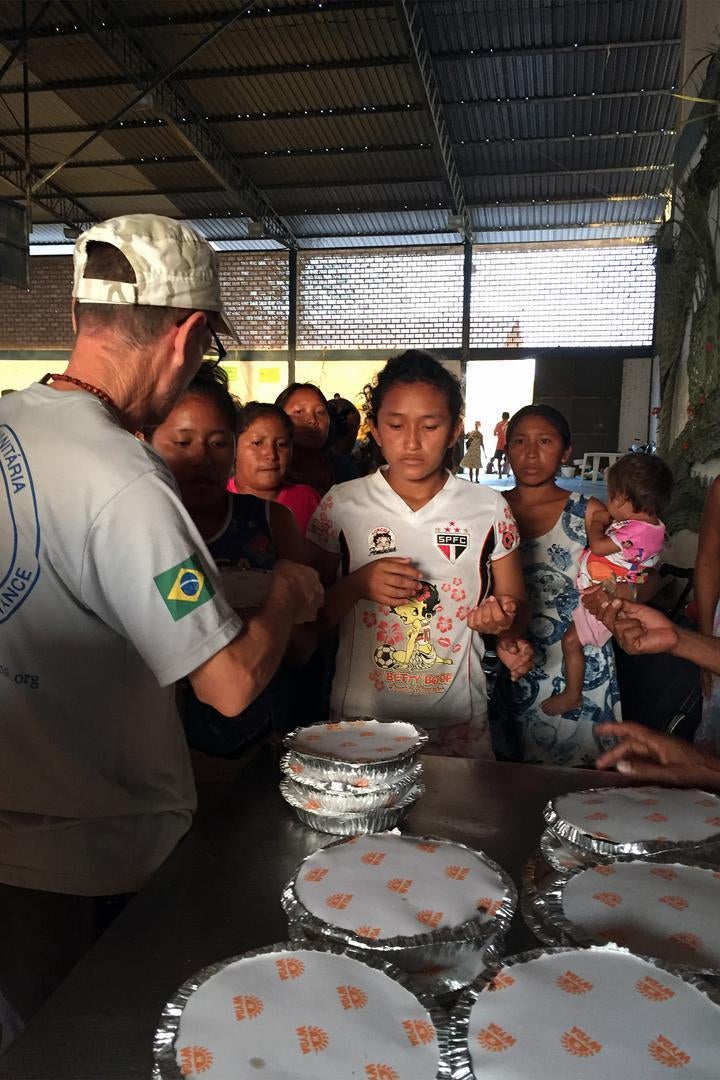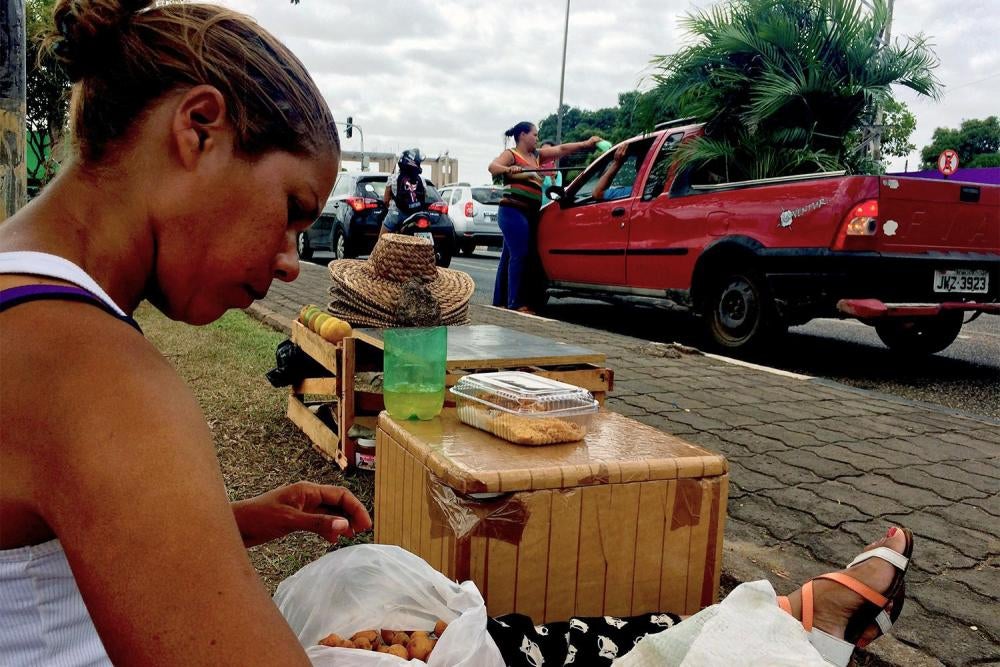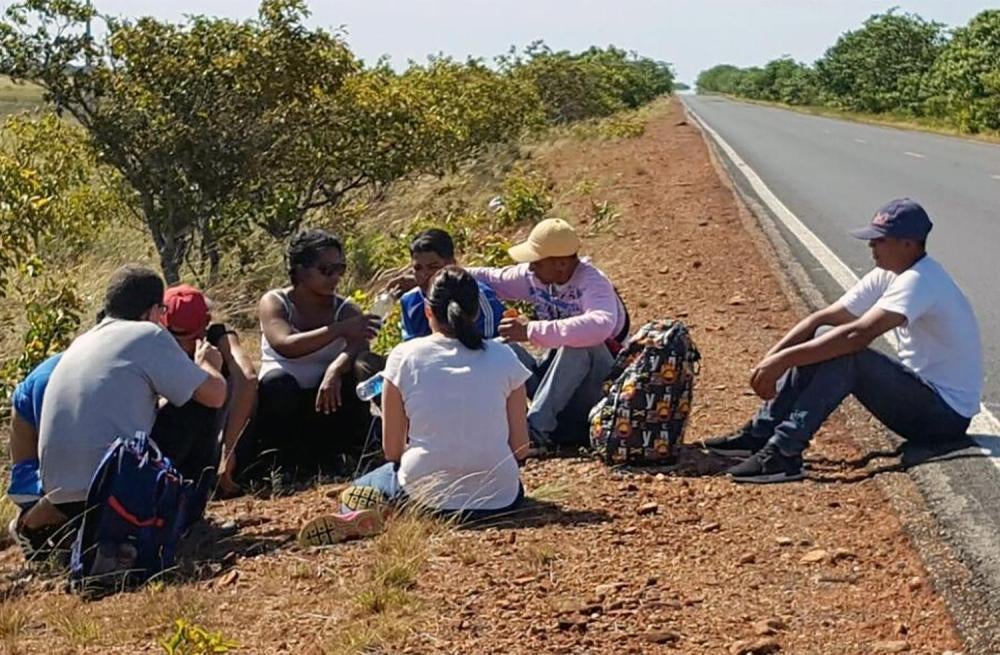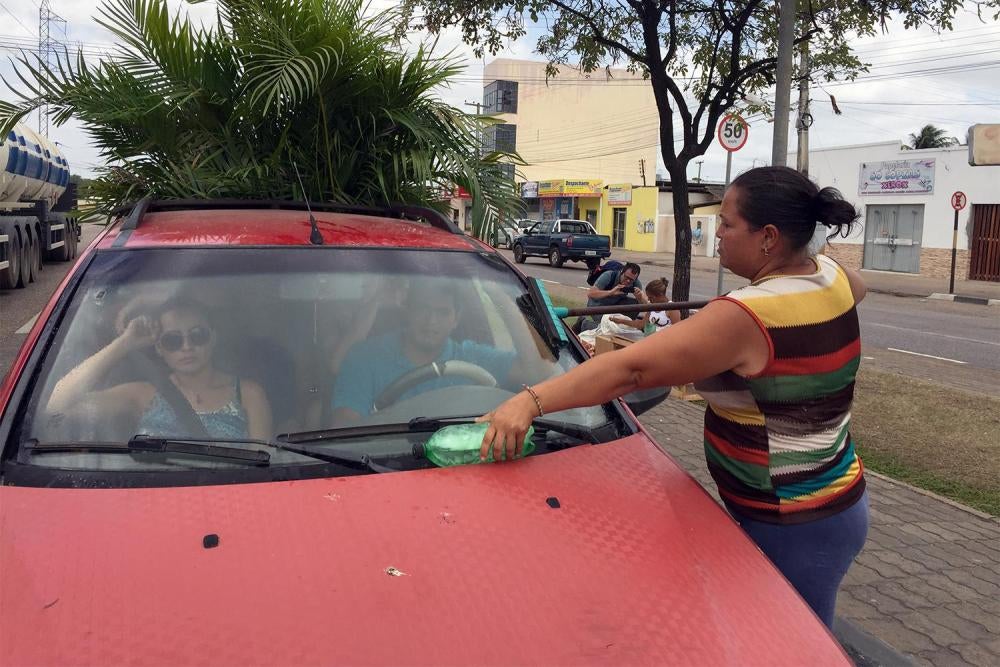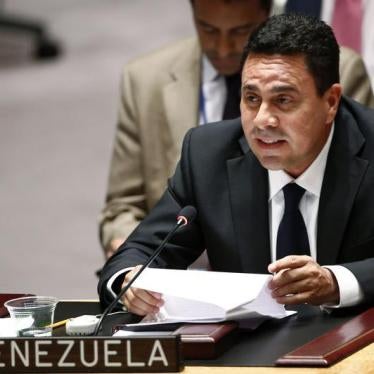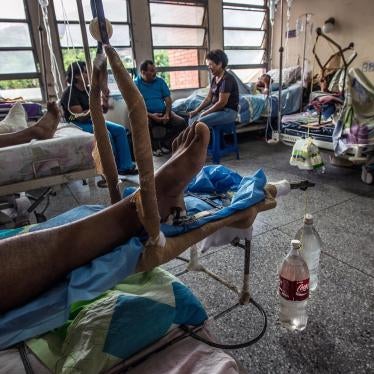(Washington, DC) – Venezuela’s humanitarian crisis is spilling across its borders, Human Rights Watch said today. Latin American governments need to apply strong pressure on the Maduro administration to address severe shortages of medicine and food in Venezuela that are causing Venezuelans to leave the country.
Tens of thousands of Venezuelans have fled a humanitarian crisis that their government denies exists and is not addressing adequately. Thousands have gone to Brazil, many entering via the border that Venezuela shares with the Brazilian state of Roraima. Some seek protection there as refugees, others seek temporary work, while others make visits seeking desperately needed medical care. The unprecedented influx of Venezuelans is straining Roraima’s already overburdened public health care system and clogging Brazil’s system for processing asylum applications.
“Brazil is struggling to meet the urgent needs of Venezuelans who are victims of a humanitarian crisis for which the Maduro administration is largely to blame,” said José Miguel Vivanco, Americas director at Human Rights Watch. “Brazil and other regional governments will ultimately have to press the Venezuelan government to stop denying the crisis and to take adequate steps to fix the problem.”
More than 12,000 Venezuelans have entered and stayed in Brazil since 2014, according to official sources. The number of Venezuelans moving to Brazil has increased more than five-fold from 2014, reaching 7,150 during the first 11 months of 2016. Many Venezuelans are living in precarious conditions on the streets and in a shelter in Boa Vista, Roraima’s capital. Despite the difficult conditions, all of the more than 60 Venezuelans Human Rights Watch interviewed in February said they were better off in Brazil than in Venezuela.
The demand for health care by Venezuelans is making it increasingly difficult for the state’s public health system to meet the needs of all its patients, both Brazilian and Venezuelan.
The General Hospital of Roraima, which serves 80 percent of adults in the state, provided care to 1,815 Venezuelans in 2016, up more than three-fold from 2015. In February 2017, the hospital’s director told Human Rights Watch that the facility was treating an average of 300 Venezuelan patients a month. The number of Venezuelan women seeking care at Roraima’s maternity hospital almost doubled in 2016, to 807. At the hospital in the border town of Pacaraima, about 80 percent of patients are Venezuelans, and Venezuelan women made more than half of prenatal care visits between January and August 2016.
Even in the hospitals where Venezuelans make up a small proportion of total patients, several health care professionals and officials said the increase in the patient load is aggravating existing strains on the state’s public health care system.
Brazilian health care providers said that Venezuelans tend to arrive at the hospital sicker than Brazilians, having failed to receive adequate treatment at home. Many are treated for complications because conditions such as HIV/AIDS, pneumonia, tuberculosis, and malaria have been left untreated due to shortages of medicines in Venezuela. As a result, doctors said, Venezuelan patients more frequently require hospitalization than local patients. Health care professionals said that even before the influx of Venezuelan patients, hospital capacity was insufficient to meet demand.
In one example Human Rights Watch found, Barbara Rosales, 21, went to the hospital in the Venezuelan city of Santa Elena de Uairén with complications in her six-month pregnancy in January. The hospital lacked the medicine she needed and ended up sending her to Brazil in a car accompanied by a nurse but without any medicines. Rosales was immediately hospitalized in Brazil. Five days later, her baby was born, weighing one kilogram. When Human Rights Watch visited the hospital a month later, the baby remained in intensive care.
Roraima authorities have provided additional funding to state hospitals to respond to the increased demand for services. In December, the governor declared a health emergency to obtain federal aid. But aid had not arrived, state authorities said in February.
Other Venezuelans said they had moved to Brazil because they could not buy the medications they needed at home. Geraldine Dhil, 32, said that she crossed the border trying to find a job to buy medicines in Brazil to treat her 13-year-old daughter, who has cancer. Human Rights Watch interviewed her while she was walking the 200 kilometers (125 miles) from the border to Boa Vista in stifling heat.
According to information gathered by the office of the UN High Commissioner for Refugees (UNHCR) in Brazil over the past five months in Roraima, the influx from Venezuela is mixed – some would qualify for international protection as refugees while others would not. Former officials of the Brazilian refugee agency told Human Rights Watch that they shared the same view.
Nearly all the Venezuelans interviewed said they primarily left Venezuela either because they could not buy adequate food or medicines for their families, or because of crime. Most had requested asylum. The Brazilian government reported that the number of Venezuelans seeking asylum has skyrocketed, from 54 in 2013 to 2,595 in the first 11 months of 2016. As of December 31, the Justice Ministry had only decided 89 of the 4,670 cases of Venezuelans who had requested asylum since 2012, granting asylum in 34 of those cases. The backlog of unresolved claims from Venezuelans is slowing the processing of all asylum claims throughout Brazil.
More than 4,000 Venezuelans in Roraima have been stuck for months on a waiting list for appointments to file asylum requests. Brazilian law allows people who have requested asylum to stay in Brazil, obtain work permits, and enroll their children in school. But it is unclear whether the appointment slips that the Federal Police have been handing out, some for as late as 2018, are valid to certify that the person has an official temporary permission to stay. Even if Venezuelans are not deported while they wait for their appointment, they have no legal authorization to work, which makes them vulnerable to exploitation.
In 2016, authorities deported 514 Venezuelans from Roraima – compared with just 20 in 2015. The Federal Police tried to deport 450 members of the Venezuelan Warao indigenous people in December, but the federal Public Defender’s Office filed a habeas corpus petition with a local judge on the grounds that the attempt was arbitrary, and the judge stopped the deportation at the last minute.
In March, the Brazilian National Council of Migration, which is part of the Ministry of Labor, approved a resolution to grant Venezuelans two-year residence permits, a move that could ease pressure on the overwhelmed Brazilian asylum process if adequately implemented.
In May 2016, after the Organization of American States (OAS) Secretary General Luis Almagro presented a report on the human rights and humanitarian crisis in Venezuela, the OAS Permanent Council agreed to move forward with an evaluation of Venezuela’s compliance with the Inter-American Democratic Charter, despite the Venezuelan government’s claim that it violated its sovereignty. In mid-March 2017, Almagro reopened the debate, stating Venezuela was violating the charter’s provisions.
On March 28, 20 OAS member states voted to debate the Venezuela crisis at a Permanent Council meeting, despite Venezuela’s insistence that it would constitute intervening in the country’s internal affairs. During the discussion, some OAS members delivered a strong message that Venezuela’s crisis is undermining human rights and democracy. Several regional governments issued similarly strong messages days later, after the Venezuelan Supreme Court effectively shut down the National Assembly on March 29. Although the court partly backtracked three days later, after Maduro asked it to revise the ruling, it has not reversed previous decisions that had already severely undermined the National Assembly’s powers.
On April 18, 2017, Human Rights Watch presented its findings on the impact of Venezuelan immigration to Brazil to Almagro.
“Putting Venezuela at the top of the region’s foreign policy priorities is key to addressing a problem that is already having an impact outside of Venezuela’s borders,” Vivanco said.
For the detailed findings, accounts by people interviewed, and steps taken by the Brazilian government to address the situation, please see below.
Human Rights Watch Findings
In February, Human Rights Watch interviewed close to 100 people in Roraima, including Venezuelans who had recently arrived in Brazil, Brazilian government officials, health care professionals, academics, and activists. The Venezuelans came from Caracas, Venezuela’s capital, and nine states – Aragua, Anzoátegui, Bolivar, Carabobo, Mérida, Miranda, Monagas, Sucre, and Zulia – some of which are more than 1,000 kilometers from the border. Human Rights Watch also reviewed state government health care statistics, information provided by the two main hospitals in Boa Vista, and judicial files and resolutions issued by Brazilian state and federal authorities.
The Humanitarian Crisis in Venezuela
Venezuela is experiencing a profound humanitarian crisis, as Human Rights Watch and others have documented. Medicine, basic medical supplies, and even food are in such short supply that many Venezuelans cannot feed their families or get adequate medical care. Low and middle-income families who rely on items subject to government-set maximum prices are particularly affected.
The Venezuelan government’s response has been woefully inadequate. Denying that a crisis exists, authorities have neither implemented effective policies to alleviate it nor made serious efforts to obtain international humanitarian aid that could significantly bolster its own limited efforts. In late March, President Nicolás Maduro said on television that he had asked the United Nations for help to obtain medicines, without providing any additional information, but he still has not acknowledged the extent of the crisis. Meanwhile, Venezuelans’ rights to health and food are being seriously undermined, with no end in sight.
Venezuelan Migration to Brazil
In desperation, Venezuelans are fleeing, and for the many who cannot afford plane tickets, their destination is just across the border to Brazil’s northern state of Roraima.
Tens of thousands have entered Brazil since 2013. Most have been temporary migrants who returned home after making some money.
However, more than 12,000 have stayed in Brazil since 2014, according to an official report. The number of Venezuelans who enter Brazil and stay each year has increased more than five-fold, from 1,341 in 2014 to 7,150 in the first 11 months of 2016, according to official data. Most recorded entries were registered at the crossing between Santa Elena de Uairén, Venezuela, and Pacaraima, Brazil. Others have crossed the border without informing Brazilian authorities, Brazilian Federal Police officials told Human Rights Watch. (Venezuela and Brazil share a 2,200-kilometer-long land border.)
Human Rights Watch interviewed 65 Venezuelans in Roraima who had recently arrived. All said they had fled Venezuela because they could not afford to buy enough food for their families, they did not have access to adequate health care, or they had been – or feared that they would be – victims of violent crime – or a combination of those reasons. Almost everyone was sending food and money back to family members, mostly children or parents. Some said they had suffered or witnessed political persecution in Venezuela, although none said it was their primary reason for fleeing.
Some Venezuelan immigrants are starting to move out of Roraima, many to the city of Manaus, Amazonas state, which is at the end of the only paved road that connects Roraima to the rest of Brazil, said Venezuelans and Brazilian government officials interviewed. Although there are no official statistics, at least 200 have already arrived in Manaus, according to local press accounts.
Impact on Roraima’s Healthcare System
Roraima’s public healthcare system has for years struggled to meet local needs, according to César Farias, the state health secretary, and health professionals interviewed. Some patients were assigned to reclining chairs in corridors due to a shortage of beds, healthcare professionals said.
The influx of Venezuelans in 2016 – both of patients now living in Brazil and temporary visitors seeking health care – has made a difficult situation worse, a review of official data and key informant interviews with health care professionals at the main hospitals in Boa Vista and Pacaraima indicate. While in the past Brazilians living in Roraima were sometimes treated in Venezuelan facilities under a bilateral agreement, the current movement of patients is almost entirely from Venezuela to Brazil.
Between January and the beginning of December 2016, more than 7,600 Venezuelans were treated at the Roraima General Hospital, the main health care facility in the state, which treats over 80 percent of the adult population; the maternity hospital Nossa Senhora de Nazareth, the only state facility dedicated to maternal health care; and the Pacaraima hospital, which serves the border area.
At the Pacaraima hospital, about 80 percent of patients are Venezuelans, a head nurse said. The increased demand in Pacaraima – a border city of about 12,000 – is extending aspects of Venezuela’s crisis into Brazil. Some essential medical supplies, such as gauze, IV fluids, and syringes, and basic medicines to provide basic health care, such as paracetamol for children, are in critically short supply, the nurse said. A state government emergency decree states that, between January and August 2016, more than half of the prenatal care visits in Pacaraima were by Venezuelan women.
At the two main healthcare facilities in Boa Vista, the vast majority of patients are Brazilian. Nonetheless, health officials and workers said the sharp increase in Venezuelan patients has put an unprecedented strain on the ability to adequately treat patients. Healthcare professionals said that because of complications due to a lack of adequate treatment at home, Venezuelan patients frequently require complex medical treatment or hospitalization and extended hospital stays.
This puts a further strain on a system that at the beginning of 2016 already had a statewide deficit of 170 beds to serve the local population, according to the state health secretary and hospital staff. The director of the Roraima General Hospital said that while 7 percent of Brazilian patients need to be hospitalized, for Venezuelans, it is about 20 percent.
Doctors said that many Venezuelans need treatment for conditions left untreated, such as HIV or tuberculosis. In cases of acute conditions, such as pneumonia or malaria, many Venezuelan patients rush to Brazilian hospitals because of the lack of medicines at home. Based on official statistics, as of August 2016, 77 percent of the 2,517 malaria patients in Roraima were Venezuelans.
At the General Hospital of Roraima, 1,815 Venezuelans were treated in 2016 – up from 537 in 2015. In February, several healthcare professionals in the emergency room estimated that at least 30 percent of patients were Venezuelans. Doctors and nurses said that the increase of Venezuelan patients was significant and continued in 2017. An average of 300 Venezuelan patients were being treated monthly, the hospital director said.
The Roraima General Hospital director said that her hospital had faced shortages of medicines and supplies due to the influx of Venezuelan patients. She said that each hospital requests medicines and supplies to treat patients based on the number of treatments provided during the previous year, and that the hospital had not anticipated the influx of Venezuelans in 2016. As a result, the hospital used up the medicines and supplies for the year by August. The director had to request emergency supplies to provide adequate medical care for the rest of the year.
The number of Venezuelan women who sought help at the maternity hospital increased from 368 in 2014 to 453 in 2015 to 807 in 2016. In 2016, more than 100 had Caesarian sections, based on hospital data. Other women experienced pregnancy-related complications, some of which had not been adequately addressed due to a lack of prenatal care, and often had to remain hospitalized, the hospital’s clinical director said.
Accounts by Venezuelans
In January, María Coromoto Peñuela took her son from her hometown of Santa Elena de Uairén, on the Venezuelan side of the border, to Boa Vista for an appendectomy. The surgery could not be performed at home due to scarcity of medical supplies. Two weeks later, a family friend drove her 68-year-old husband, Olimpo Lozada Marcano, to Brazil as well because of what she said were complications from a gallstone that could not be treated in Venezuela. The hospital director said that had Lozada obtained adequate treatment when he first developed symptoms, he would not have required hospitalization for emergency surgery.
Barbara Rosales, 21, went to the hospital in the Venezuelan city of Santa Elena de Uairén with complications in her six-month pregnancy in January 2017. A doctor gave her a medical order for treatment in Brazil, saying that the hospital could not treat her due to a lack of medicines and would not be able to care for her baby if it was born prematurely, she said.
As the hospital’s ambulance was out of service, the hospital arranged for a car to drive her to Boa Vista – although she had to pay for the gas – and assigned a nurse to travel with her. Rosales said she fainted three times during the trip and the nurse did not have any medicine to give her. When she arrived at the maternity hospital, Rosales was immediately hospitalized. Five days later, her baby, who weighed one kilogram, was born. When Human Rights Watch visited the hospital a month later, the baby was doing well but remained in intensive care. Rosales said she would return to Santa Elena de Uairén once the baby was released from the hospital and given the first vaccines, which were unavailable in Venezuela.
Some Venezuelans said they had moved to Brazil because they could not buy the medications they needed at home. Geraldine Dhil, 32, said that she crossed the border trying to find a job to buy medicines in Brazil to treat her 13-year-old daughter, who has cancer. Human Rights Watch interviewed her while she was walking the 200 kilometers from the border to Boa Vista. At the side of the road, it was 32 degrees Celsius (90 degrees Fahrenheit) at 10 a.m., and the grasslands of northern Roraima provided virtually no shade. Marlene Fuentemayor, 37, told Human Rights Watch that she moved to Boa Vista to be able to feed her family and buy medicines for her 12-year-old son, who was diagnosed with Asperger syndrome, an autism spectrum disorder.
Others said they came to buy medicines to take back home, due to the shortages in Venezuela. Enriqueta Rivero, 70, interviewed at the Brazilian Federal Police border post in Pacaraima, said she had not been able to find medications for high blood pressure for months and her grandchildren were taking her to Boa Vista to find the medicines the doctor at home had prescribed.
The Impact on Brazil’s Refugee System
The 1951 Refugee Convention defines a “refugee” as someone who “owing to well-founded fear of being persecuted for reasons of race, religion, nationality, membership of a particular social group or political opinion, is outside the country of his nationality and is unable or, owing to such fear, is unwilling to avail himself of the protection of that country.” The non-binding 1984 Cartagena Declaration has a broader refugee definition, which includes people fleeing from “generalized violence, foreign aggression, internal conflicts, massive violations of human rights or other circumstances which have seriously disturbed public order.” Brazilian law incorporates the Refugee Convention and also considers someone a refugee if they are leaving their country due to “grave and generalized human rights violations.”
In March, the Justice Ministry told Human Rights Watch that 34 Venezuelans had obtained asylum in Brazil since 2012, 29 of them due to religious persecution or their membership in a targeted social group, three due to grave and generalized human rights violations, and two due to political persecution. Between 2012 and 2016, 55 asylum requests by Venezuelans were dismissed, the ministry said.
Although most Venezuelans arriving in Brazil say that the primary reasons for leaving Venezuela are economic – the great difficulty they face to buy food and medicines for their families – and the fear of being victims of crime, thousands have requested asylum.
Members of the federal Prosecutor’s Office and the federal Public Defender’s Office told Human Rights Watch in February that seeking asylum was virtually the only alternative that Venezuelans had. Brazil’s immigration law – passed during its dictatorship – offers very few possibilities for legal migration.
To request asylum, Venezuelans simply need to state before a federal police officer that they are seeking asylum, and are not required at the outset to provide evidence to corroborate their claims. Under Brazilian law, while their asylum requests are being processed, they cannot be deported, are entitled to a work permit, and are allowed to enroll children in school.
CONARE, the federal refugee agency, makes the final refugee status decision in a process that used to take an average of two years before the increase in the number of Venezuelan applicants, according to Rosilene Duarte Santiago, the Federal Police general director in Roraima.
As of December 31, 2016, 4,670 Venezuelans had requested asylum in Brazil since 2012, the Justice Ministry told Human Rights Watch. According to other official sources, the number of Venezuelans seeking asylum in Brazil increased from 54 in 2013 to 208 in 2014, 825 in 2015, and 2,595 between January and December 1, 2016. In Roraima, nine Venezuelans sought asylum in 2014, 234 in 2015, and 2,230 in 2016. The increased Venezuelan immigration in Brazil coincides with the deterioration of the humanitarian situation in Venezuela.
Human Rights Watch asked the Justice Ministry to provide updated information on asylum applications and asylum approval rates. The government response, dated March 3, does not include information for 2017. However, local authorities confirmed that the number of requests remained high in 2017, and most Venezuelans arriving in Roraima interviewed in February planned to seek asylum, or already had.
Federal Police in Roraima have had insufficient personnel to process the increased asylum requests since the beginning of 2016. To address this problem, the Federal Police in Roraima created a system – not provided for in any law – of giving Venezuelans appointments to lodge their asylum requests months later. In February, the Federal Police received an average of 50 to 70 asylum requests a day and were scheduling approximately 200 people per day to file an application later. The waiting list was 4,000 names long in February, said the Federal Police general director in Boa Vista. Human Rights Watch reviewed several slips of paper with appointment dates, and interviewed dozens of Venezuelans who were waiting for an appointment that they had been told would be later in 2017 or in 2018.
In the meantime, the Federal Police said, Venezuelans with the receipt showing they had an appointment would not be deported. However, other authorities, including Edinéia Chagas, the Civil Police chief in the state of Roraima, and Roberta Alvim, a federal public defender, told Human Rights Watch that there was no clarity regarding the legal validity of these appointments.
Even if not deported, Venezuelans who are on this waiting list are vulnerable to exploitation since they are not allowed to obtain a work permit at that stage. A few Venezuelans also said that their employers failed to pay them for their work, but they did not file a complaint because they lacked work permits.
Several Venezuelan women who had received appointment slips but no work authorization said they were engaging in sex work for the first time in their lives and that they did not report crimes they suffered or witnessed – such as robbery, beatings, kidnapping, and rape – because they feared being deported.
In one case, a 27-year-old sex worker was kidnapped by a client, who raped her several times in his car and nearly choked her to death, said two other sex workers who lived with her and saw the marks on her throat. The victim told them she had escaped after the man stopped his car at a store. The two witnesses said that they saw the man again in the area where they work days later, which prompted the victim to return to Venezuela. “She did not tell the police because she was afraid. She had no papers,” one of the sex workers said.
The increased number of asylum applications from Venezuelans that CONARE needs to evaluate delays the processing of every asylum request in the country, the director of the immigration of the Federal Police in Roraima said.
Threat of Deportation
In 2016, Brazilian authorities deported 514 Venezuelans from Roraima – up from approximately 20 in 2015, according to the Federal Police in Roraima. There were cases of individual deportations as well as the mass deportation by the Federal Police of approximately 200 Venezuelans, including dozens of children, in September, Alvim, the federal public defender, said.
At about 4 a.m. on December 9, members of the municipal guard and state military police rounded up approximately 450 indigenous Venezuelans, including about 200 children, who were sleeping on the street at a local market in Boa Vista. Local vendors complained of reduced sales because the Venezuelans were sleeping there. Members of the group interviewed said they had left Venezuela because of a lack of food.
The Venezuelans were taken to the Federal Police headquarters and by 4 p.m. were told to board a series of buses to be deported back to Venezuela.
The Federal Police said its officers interviewed each Venezuelan individually and followed the legal process established by a law that allows the authorities to “summarily” deport foreigners “in cases of infractions against national security, political or social order, popular economy, … or violation of a prohibition provided by in the immigration law.” In these cases, authorities may deport people in a summary process that can take no more than 15 days and is not subject to appeal.
Brazil’s Congress is debating a proposed revision of the law. While the current law – adopted during Brazil’s dictatorship – prioritizes protecting “national security,” the bill states that human rights will be guiding principles of Brazil’s immigration policies. The legislative proposal opens new paths for legal migration into Brazil, allowing the government, for example, to grant humanitarian visas to nationals of countries under “grave or imminent institutional instability, armed conflict, large-scale calamity, grave violation of human rights or international humanitarian law, or other circumstances.”
Human Rights Watch interviewed people who were subject to the summary deportation attempt on December 9 and reviewed police documents. Eight people said they had been sleeping when military police officers and municipal guards rounded them up and forced them onto buses. The agents took away the IDs of those who had them, without asking if any of them had requested asylum – although some had – they said.
Federal prosecutors, who in Brazil are also charged with protecting basic rights, told Human Rights Watch and said in written judicial documents that the Federal Police officers did not provide an interpreter, though the people involved were members of the Warao indigenous community and many did not speak Portuguese or Spanish.
More than 240 deportation documents that Human Rights Watch had access to had the exact same text, except for the name of the deportee and the person’s Venezuelan ID number, if she or he had one. None were signed by the deportee – they had a stamp saying that the person being deported was “illiterate,” which would have made it impossible for people to read the terms of their deportations. All the documents were signed by the same federal police officer and by the same two witnesses.
Alvim filed an habeas corpus request that day and asked a local judge to suspend the mass deportation, contending that it violated the deportees’ due process rights and Brazil’s obligation not to deport groups of people provided for in Article 22(9) of the American Convention on Human Rights. The judge ordered the Federal Police to stop the deportations when the buses were arriving at the border. Some Venezuelans decided to disembark there, and the rest were driven back to Boa Vista.
There have not been any mass deportation attempts since then.
Precarious Living Conditions in Brazil
Many Venezuelan immigrants are living in precarious conditions in Roraima. People who had been construction workers, teachers, or middle-class professionals in Venezuela are now selling food or crafts, or washing windshields at stoplights. The Warao work unloading trucks at the border town of Pacaraima, make handicrafts, or beg on the streets. Human Rights Watch spoke to dozens of Venezuelans in this situation. Despite recognizing that they were living in very difficult conditions, they all said they were better off in Brazil than in Venezuela.
On December 17, a judge from the state juvenile justice system ruled that the state and municipal governments had to provide shelter, food, and security to Venezuelan immigrant children living on the streets in Boa Vista.
Ten days later, state and municipal authorities opened an improvised shelter at a local warehouse that had functioned as a public gym. The shelter – which has housed up to 500 immigrants at a time, according to official sources – was administered for months by Fraternidade, a Brazil-based international aid organization. For its work at the shelter, the group relied on the state and municipal governments’ contributions and private donations. In February, the group was planning to end its activities at the shelter, but it was unclear who would take over.
When Human Rights Watch visited the shelter in February, 180 Venezuelans were living there. They slept on hammocks or on the floor and faced very poor hygienic conditions.
The vast majority were Warao. Malnutrition in Venezuelans arriving at the shelter was “apparent,” said the director of the Center of Migration and Human Rights of the Roraima Dioceses. In mid-February, Human Rights Watch interviewed the mother of a 2-year-old girl who had arrived at the shelter weeks earlier weighing only seven kilos.
In January, the Fraternidade staff member in charge of the shelter took a 16-year-old girl who appeared to have chicken pox to the doctor and informed health authorities of the case. Although a representative from the state health secretary visited the shelter soon after, no one provided vaccinations. When Human Rights Watch visited in February, chicken pox had spread to five other people, including the girl’s 4-month-old baby.
Brazil’s Evolving Response
While the primary responsibility for the suffering of the thousands of people who are fleeing Venezuela lies with the Maduro administration, Brazil is obligated to ensure that once Venezuelans arrive in its territory, their basic rights are respected. That includes their right to health and their right not to be deported arbitrarily, as well as the principle of non-refoulement – not returning refugees to a situation where their lives or personal freedom would be at risk.
There was a consensus among authorities, prosecutors, academics, and healthcare professionals interviewed in Roraima that the influx of Venezuelans in 2016 created an unforeseen situation that Brazilian authorities at the state and federal levels are figuring out how to resolve. While the Roraima state government and federal officials recognized the problems, and have adopted some positive measures to try to address them, they have yet to ensure a sustainable solution to a problem that will not go away unless the Venezuelan government effectively addresses its humanitarian crisis.
Measures to Provide Basic Services to Venezuelans, Including Health Care
In October, Roraima Governor Suely Campos created a Cabinet for Migration Management consisting of various state authorities, to elaborate public policies to address the impact of Venezuelan immigration into the state. The group established a Center of Reference for Immigrants, which has attempted to provide basic support to Venezuelan immigrants and complied with the judicial ruling that ordered authorities to provide shelter and basic services to Venezuelan immigrant children living in the streets with their families. In mid-February, Doriedson Ribeiro, the then executive secretary of Roraima’s Civil Defense, a civilian crisis-response body charged with implementing state government policies to address the influx of Venezuelans into Roraima, told Human Rights Watch that while the state government would not challenge the judicial ruling, it cannot provide support to Venezuelans at the shelter “forever.” He also said that the current situation was unsustainable, and he did not know what would happen.
In the area of health, the state government is building two new hospitals that, when finished, would increase the number of beds by 240. The estimated completion date is June, the state health secretary said. The projects were planned years ago, and are unrelated to the influx of Venezuelans, although their completion would alleviate the increased burden on the healthcare system.
In December, Governor Campos declared a health emergency in the – municipalities of Boa Vista and Pacaraima due to an “intense migration influx.” The decree is valid for 180 days and requests federal government support to “provide quality care to Brazilians and Venezuelans.” As of February, though, the federal government had not contributed any funds, the state health secretary said.
Measures to Address the Impact on Brazil’s Refugee System
On February 3, the Federal Attorney General’s Office, the Federal Public Defenders’ Office, and the Labor Prosecutors’ Office—the unit within the Federal Attorney General’s Office that monitors labor rights—, with the support of Brazilian nongovernmental groups, presented a proposal to the National Immigration Council – a federal body that deals with immigration policies – to grant Venezuelan immigrants two-year residency and work permits, as are currently granted to nationals of other Mercosur countries.
On March 2, the National Council of Migration adopted a resolution based on the proposal, which entered into effect upon publication in the official gazette the next day. Under the new provisions, to obtain a two-year residency permit, Venezuelans must go to a Federal Police office and present a form with personal information, two pictures, a valid ID or passport, a birth certificate or consular document certifying where they were born, and a certificate stating they do not have a criminal record in Brazil, and state that they do not have a criminal record in Venezuela. Those who had previously requested asylum may decide to withdraw that application when they file for the two-year residency permit.
The new rules will be in place for a year, and may be extended. CONARE is drafting implementing regulations, and the Justice Ministry is considering measures to diminish the cost for Venezuelans to apply for these residency permits. To ensure that Venezuelan immigrants in Brazil, particularly those who arrive in Roraima with limited resources, are able to take advantage of this process, Brazilian authorities should consider minimizing the cost for applying, as well as the requirements to obtain Venezuelan documents that may be difficult to get from Venezuelan consulates, Human Rights Watch said.
